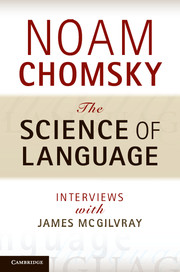Book contents
- Frontmatter
- Contents
- Introduction
- Part I The science of language and mind
- Part II Human nature and its study
- 15 Chomsky on human nature and human understanding
- 16 Human nature and evolution: thoughts on sociobiology and evolutionary psychology
- 17 Human nature again
- 18 Morality and universalization
- 19 Optimism and grounds for it
- 20 Language, agency, common sense, and science
- 21 Philosophers and their roles
- 22 Biophysical limitations on understanding
- 23 Epistemology and biological limits
- 24 Studies of mind and behavior and their limitations
- 25 Linguistics and politics
- Appendices
- Commentaries
- Glossary
- Bibliography
- Index
23 - Epistemology and biological limits
from Part II - Human nature and its study
Published online by Cambridge University Press: 05 June 2012
- Frontmatter
- Contents
- Introduction
- Part I The science of language and mind
- Part II Human nature and its study
- 15 Chomsky on human nature and human understanding
- 16 Human nature and evolution: thoughts on sociobiology and evolutionary psychology
- 17 Human nature again
- 18 Morality and universalization
- 19 Optimism and grounds for it
- 20 Language, agency, common sense, and science
- 21 Philosophers and their roles
- 22 Biophysical limitations on understanding
- 23 Epistemology and biological limits
- 24 Studies of mind and behavior and their limitations
- 25 Linguistics and politics
- Appendices
- Commentaries
- Glossary
- Bibliography
- Index
Summary
JM: You've suggested many times that human cognitive capacities have limitations; they must have, because they're biologically based. You've also suggested that one could investigate those limitations.
NC: in principle.
JM: . . . in principle. Unlike Kant, you're not going to simply exclude that kind of study. He seems to have thought that it's beyond the capacity of human beings to define the limits . . .
NC: . . . well, it might be beyond a human capacity; but that's just another empirical statement about limitations, like the statement that I can't see ultraviolet light, that it's beyond my capacity.
JM: OK; but is the investigation of our cognitive limitations in effect an investigation of the concepts that we have?
NC: Well, it may be contradictory, but I don't see any internal contradiction in the idea that we can investigate the nature of our science-forming capacities and discover something about their scope and limits. There's no internal contradiction in that program; whether we can carry it out or not is another question.
JM: And common sense has its limitations too.
NC: Unless we're angels. Either we're angels or we're organic creatures. If we're organic creatures, every capacity is going to have its scope and limits. That's the nature of the organic world. You ask “Can we ever find the truth in science?” – well, we've run into this question. Peirce, for example, thought that truth is just the limit that science reaches. That's not a good definition of truth. If our cognitive capacities are organic entities, which I take for granted they are, there is some limit they'll reach; but we have no confidence that that's the truth about the world. It may be a part of the truth; but maybe some Martian with different cognitive capacities is laughing at us and asking why we're going off in this false direction all the time. And the Martian might be right.
- Type
- Chapter
- Information
- The Science of LanguageInterviews with James McGilvray, pp. 133 - 137Publisher: Cambridge University PressPrint publication year: 2012



